Business Strategy Assessment: Entrepreneurial Ventures and Approach
VerifiedAdded on 2023/06/10
|9
|2334
|488
Essay
AI Summary
This essay examines the concept that all business strategies are planned and the result of a rational, top-down approach, referencing relevant theories and empirical evidence from entrepreneurial ventures. The essay explores various business strategies, including growth, product differentiation, and strategic planning, emphasizing their role in achieving company goals and generating profitability. It contrasts deliberate and emergent strategies, highlighting the structured nature of the top-down approach and the flexibility of emergent strategies. The discussion includes the importance of strategic planning, risk management in entrepreneurial ventures, and the impact of market trends. The essay also provides empirical evidence, emphasizing the significance of adapting to changing business environments and making strategic decisions to attain a competitive advantage. It concludes by discussing how both deliberate and emergent strategies contribute to enhancing strategizing in entrepreneurial ventures and offers insights into the factors that influence their effectiveness.
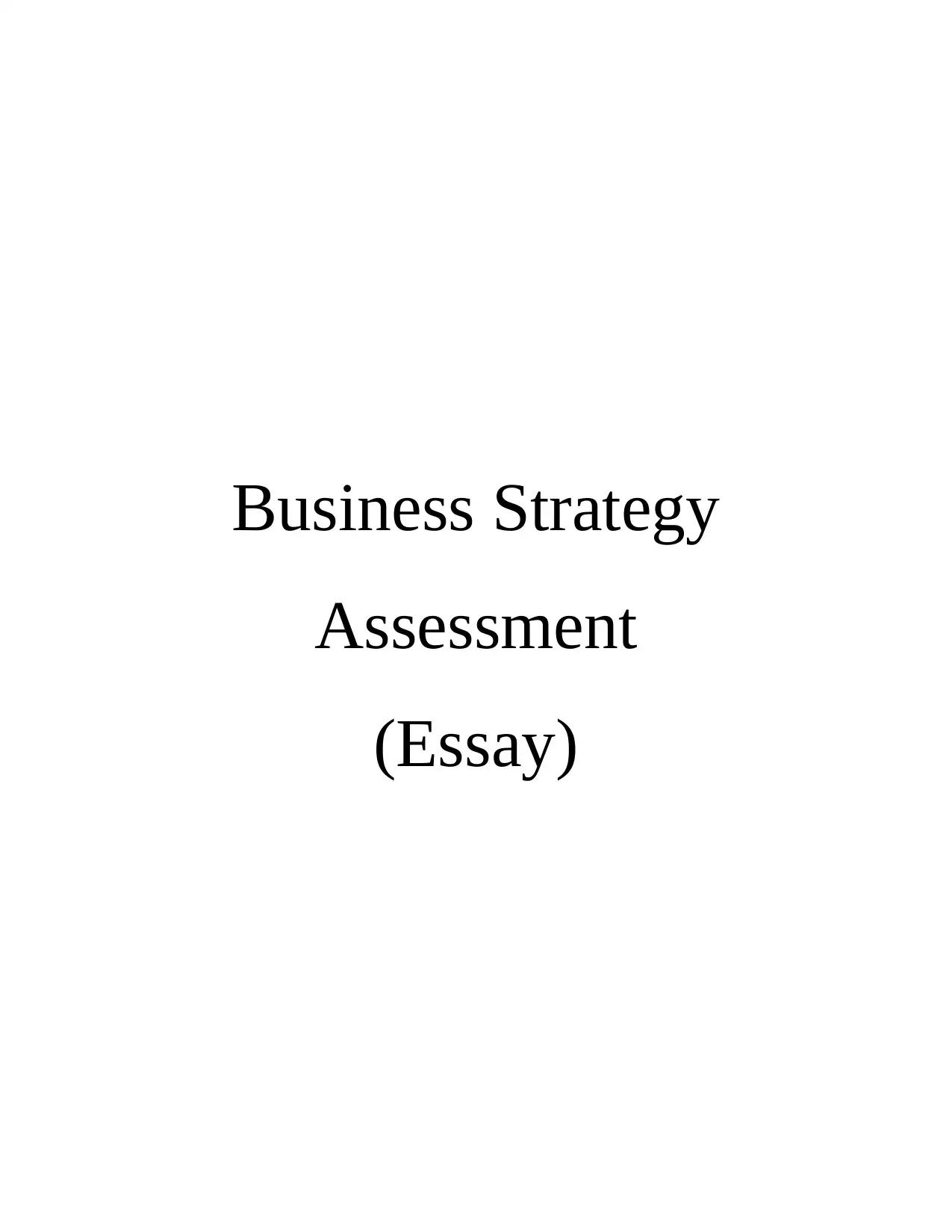
Business Strategy
Assessment
(Essay)
Assessment
(Essay)
Paraphrase This Document
Need a fresh take? Get an instant paraphrase of this document with our AI Paraphraser

Table of Contents
Essay topic: All business strategies are planned and the result of a rational, top down approach.
With reference to relevant theories and empirical evidence from entrepreneurial ventures. .........3
References .......................................................................................................................................4
Essay topic: All business strategies are planned and the result of a rational, top down approach.
With reference to relevant theories and empirical evidence from entrepreneurial ventures. .........3
References .......................................................................................................................................4
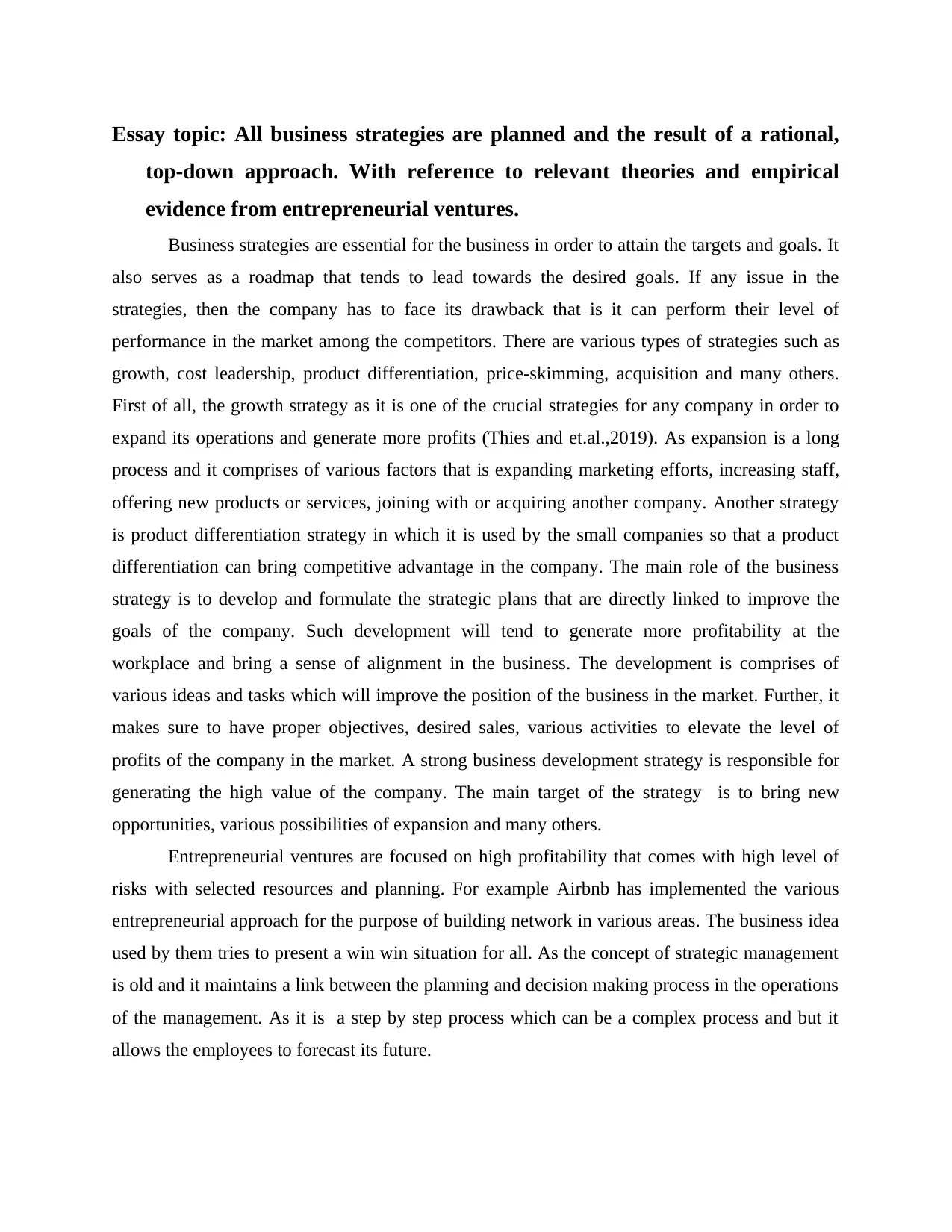
Essay topic: All business strategies are planned and the result of a rational,
top-down approach. With reference to relevant theories and empirical
evidence from entrepreneurial ventures.
Business strategies are essential for the business in order to attain the targets and goals. It
also serves as a roadmap that tends to lead towards the desired goals. If any issue in the
strategies, then the company has to face its drawback that is it can perform their level of
performance in the market among the competitors. There are various types of strategies such as
growth, cost leadership, product differentiation, price-skimming, acquisition and many others.
First of all, the growth strategy as it is one of the crucial strategies for any company in order to
expand its operations and generate more profits (Thies and et.al.,2019). As expansion is a long
process and it comprises of various factors that is expanding marketing efforts, increasing staff,
offering new products or services, joining with or acquiring another company. Another strategy
is product differentiation strategy in which it is used by the small companies so that a product
differentiation can bring competitive advantage in the company. The main role of the business
strategy is to develop and formulate the strategic plans that are directly linked to improve the
goals of the company. Such development will tend to generate more profitability at the
workplace and bring a sense of alignment in the business. The development is comprises of
various ideas and tasks which will improve the position of the business in the market. Further, it
makes sure to have proper objectives, desired sales, various activities to elevate the level of
profits of the company in the market. A strong business development strategy is responsible for
generating the high value of the company. The main target of the strategy is to bring new
opportunities, various possibilities of expansion and many others.
Entrepreneurial ventures are focused on high profitability that comes with high level of
risks with selected resources and planning. For example Airbnb has implemented the various
entrepreneurial approach for the purpose of building network in various areas. The business idea
used by them tries to present a win win situation for all. As the concept of strategic management
is old and it maintains a link between the planning and decision making process in the operations
of the management. As it is a step by step process which can be a complex process and but it
allows the employees to forecast its future.
top-down approach. With reference to relevant theories and empirical
evidence from entrepreneurial ventures.
Business strategies are essential for the business in order to attain the targets and goals. It
also serves as a roadmap that tends to lead towards the desired goals. If any issue in the
strategies, then the company has to face its drawback that is it can perform their level of
performance in the market among the competitors. There are various types of strategies such as
growth, cost leadership, product differentiation, price-skimming, acquisition and many others.
First of all, the growth strategy as it is one of the crucial strategies for any company in order to
expand its operations and generate more profits (Thies and et.al.,2019). As expansion is a long
process and it comprises of various factors that is expanding marketing efforts, increasing staff,
offering new products or services, joining with or acquiring another company. Another strategy
is product differentiation strategy in which it is used by the small companies so that a product
differentiation can bring competitive advantage in the company. The main role of the business
strategy is to develop and formulate the strategic plans that are directly linked to improve the
goals of the company. Such development will tend to generate more profitability at the
workplace and bring a sense of alignment in the business. The development is comprises of
various ideas and tasks which will improve the position of the business in the market. Further, it
makes sure to have proper objectives, desired sales, various activities to elevate the level of
profits of the company in the market. A strong business development strategy is responsible for
generating the high value of the company. The main target of the strategy is to bring new
opportunities, various possibilities of expansion and many others.
Entrepreneurial ventures are focused on high profitability that comes with high level of
risks with selected resources and planning. For example Airbnb has implemented the various
entrepreneurial approach for the purpose of building network in various areas. The business idea
used by them tries to present a win win situation for all. As the concept of strategic management
is old and it maintains a link between the planning and decision making process in the operations
of the management. As it is a step by step process which can be a complex process and but it
allows the employees to forecast its future.
⊘ This is a preview!⊘
Do you want full access?
Subscribe today to unlock all pages.

Trusted by 1+ million students worldwide
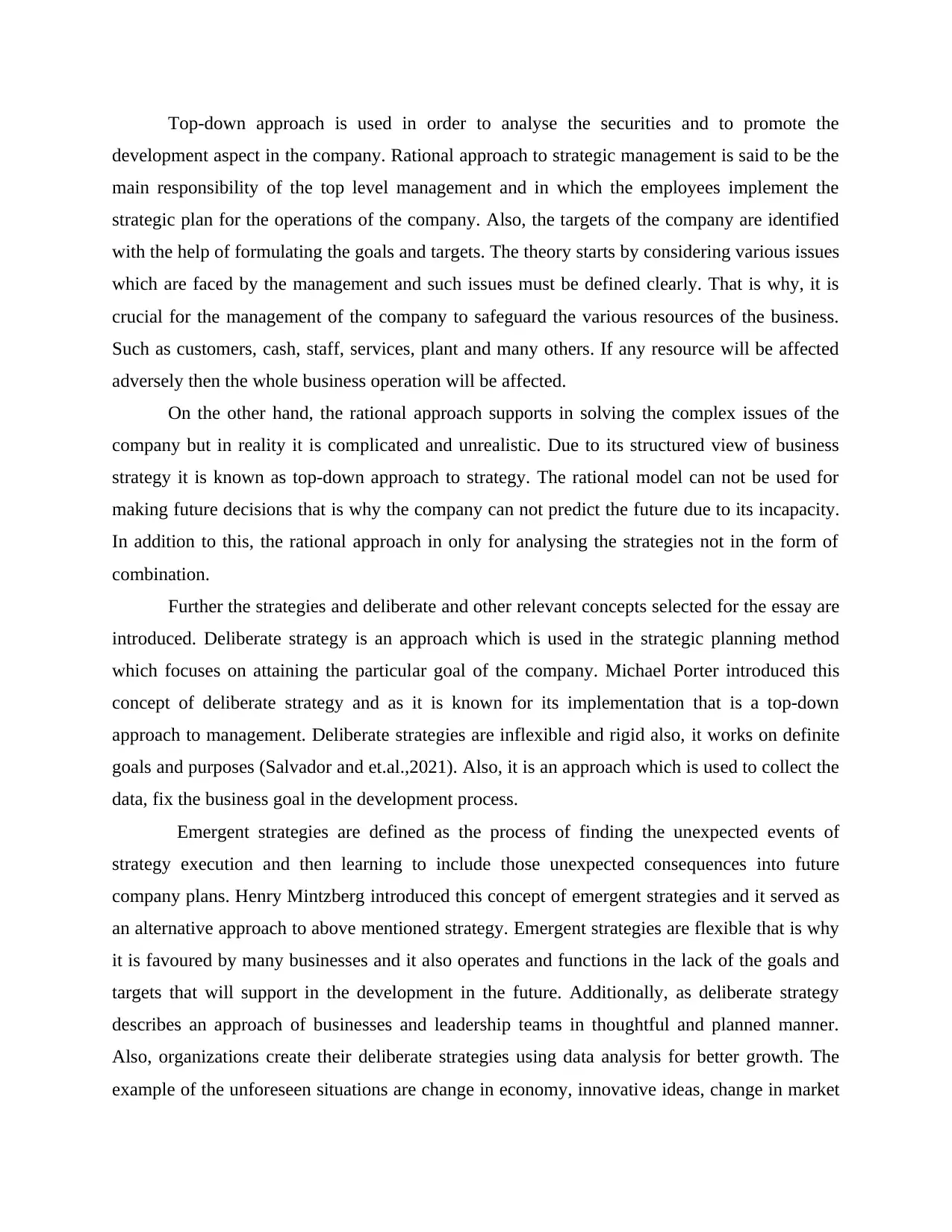
Top-down approach is used in order to analyse the securities and to promote the
development aspect in the company. Rational approach to strategic management is said to be the
main responsibility of the top level management and in which the employees implement the
strategic plan for the operations of the company. Also, the targets of the company are identified
with the help of formulating the goals and targets. The theory starts by considering various issues
which are faced by the management and such issues must be defined clearly. That is why, it is
crucial for the management of the company to safeguard the various resources of the business.
Such as customers, cash, staff, services, plant and many others. If any resource will be affected
adversely then the whole business operation will be affected.
On the other hand, the rational approach supports in solving the complex issues of the
company but in reality it is complicated and unrealistic. Due to its structured view of business
strategy it is known as top-down approach to strategy. The rational model can not be used for
making future decisions that is why the company can not predict the future due to its incapacity.
In addition to this, the rational approach in only for analysing the strategies not in the form of
combination.
Further the strategies and deliberate and other relevant concepts selected for the essay are
introduced. Deliberate strategy is an approach which is used in the strategic planning method
which focuses on attaining the particular goal of the company. Michael Porter introduced this
concept of deliberate strategy and as it is known for its implementation that is a top-down
approach to management. Deliberate strategies are inflexible and rigid also, it works on definite
goals and purposes (Salvador and et.al.,2021). Also, it is an approach which is used to collect the
data, fix the business goal in the development process.
Emergent strategies are defined as the process of finding the unexpected events of
strategy execution and then learning to include those unexpected consequences into future
company plans. Henry Mintzberg introduced this concept of emergent strategies and it served as
an alternative approach to above mentioned strategy. Emergent strategies are flexible that is why
it is favoured by many businesses and it also operates and functions in the lack of the goals and
targets that will support in the development in the future. Additionally, as deliberate strategy
describes an approach of businesses and leadership teams in thoughtful and planned manner.
Also, organizations create their deliberate strategies using data analysis for better growth. The
example of the unforeseen situations are change in economy, innovative ideas, change in market
development aspect in the company. Rational approach to strategic management is said to be the
main responsibility of the top level management and in which the employees implement the
strategic plan for the operations of the company. Also, the targets of the company are identified
with the help of formulating the goals and targets. The theory starts by considering various issues
which are faced by the management and such issues must be defined clearly. That is why, it is
crucial for the management of the company to safeguard the various resources of the business.
Such as customers, cash, staff, services, plant and many others. If any resource will be affected
adversely then the whole business operation will be affected.
On the other hand, the rational approach supports in solving the complex issues of the
company but in reality it is complicated and unrealistic. Due to its structured view of business
strategy it is known as top-down approach to strategy. The rational model can not be used for
making future decisions that is why the company can not predict the future due to its incapacity.
In addition to this, the rational approach in only for analysing the strategies not in the form of
combination.
Further the strategies and deliberate and other relevant concepts selected for the essay are
introduced. Deliberate strategy is an approach which is used in the strategic planning method
which focuses on attaining the particular goal of the company. Michael Porter introduced this
concept of deliberate strategy and as it is known for its implementation that is a top-down
approach to management. Deliberate strategies are inflexible and rigid also, it works on definite
goals and purposes (Salvador and et.al.,2021). Also, it is an approach which is used to collect the
data, fix the business goal in the development process.
Emergent strategies are defined as the process of finding the unexpected events of
strategy execution and then learning to include those unexpected consequences into future
company plans. Henry Mintzberg introduced this concept of emergent strategies and it served as
an alternative approach to above mentioned strategy. Emergent strategies are flexible that is why
it is favoured by many businesses and it also operates and functions in the lack of the goals and
targets that will support in the development in the future. Additionally, as deliberate strategy
describes an approach of businesses and leadership teams in thoughtful and planned manner.
Also, organizations create their deliberate strategies using data analysis for better growth. The
example of the unforeseen situations are change in economy, innovative ideas, change in market
Paraphrase This Document
Need a fresh take? Get an instant paraphrase of this document with our AI Paraphraser
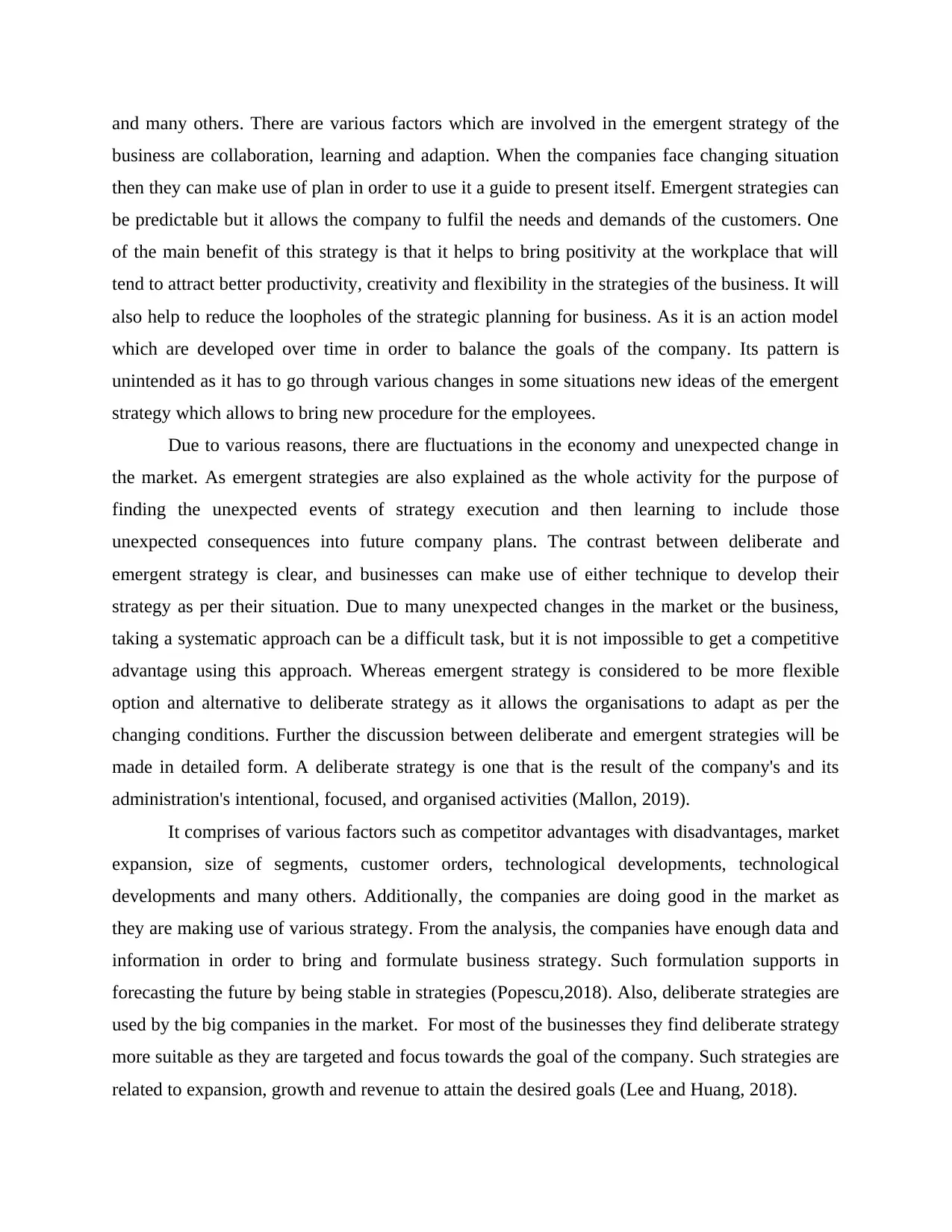
and many others. There are various factors which are involved in the emergent strategy of the
business are collaboration, learning and adaption. When the companies face changing situation
then they can make use of plan in order to use it a guide to present itself. Emergent strategies can
be predictable but it allows the company to fulfil the needs and demands of the customers. One
of the main benefit of this strategy is that it helps to bring positivity at the workplace that will
tend to attract better productivity, creativity and flexibility in the strategies of the business. It will
also help to reduce the loopholes of the strategic planning for business. As it is an action model
which are developed over time in order to balance the goals of the company. Its pattern is
unintended as it has to go through various changes in some situations new ideas of the emergent
strategy which allows to bring new procedure for the employees.
Due to various reasons, there are fluctuations in the economy and unexpected change in
the market. As emergent strategies are also explained as the whole activity for the purpose of
finding the unexpected events of strategy execution and then learning to include those
unexpected consequences into future company plans. The contrast between deliberate and
emergent strategy is clear, and businesses can make use of either technique to develop their
strategy as per their situation. Due to many unexpected changes in the market or the business,
taking a systematic approach can be a difficult task, but it is not impossible to get a competitive
advantage using this approach. Whereas emergent strategy is considered to be more flexible
option and alternative to deliberate strategy as it allows the organisations to adapt as per the
changing conditions. Further the discussion between deliberate and emergent strategies will be
made in detailed form. A deliberate strategy is one that is the result of the company's and its
administration's intentional, focused, and organised activities (Mallon, 2019).
It comprises of various factors such as competitor advantages with disadvantages, market
expansion, size of segments, customer orders, technological developments, technological
developments and many others. Additionally, the companies are doing good in the market as
they are making use of various strategy. From the analysis, the companies have enough data and
information in order to bring and formulate business strategy. Such formulation supports in
forecasting the future by being stable in strategies (Popescu,2018). Also, deliberate strategies are
used by the big companies in the market. For most of the businesses they find deliberate strategy
more suitable as they are targeted and focus towards the goal of the company. Such strategies are
related to expansion, growth and revenue to attain the desired goals (Lee and Huang, 2018).
business are collaboration, learning and adaption. When the companies face changing situation
then they can make use of plan in order to use it a guide to present itself. Emergent strategies can
be predictable but it allows the company to fulfil the needs and demands of the customers. One
of the main benefit of this strategy is that it helps to bring positivity at the workplace that will
tend to attract better productivity, creativity and flexibility in the strategies of the business. It will
also help to reduce the loopholes of the strategic planning for business. As it is an action model
which are developed over time in order to balance the goals of the company. Its pattern is
unintended as it has to go through various changes in some situations new ideas of the emergent
strategy which allows to bring new procedure for the employees.
Due to various reasons, there are fluctuations in the economy and unexpected change in
the market. As emergent strategies are also explained as the whole activity for the purpose of
finding the unexpected events of strategy execution and then learning to include those
unexpected consequences into future company plans. The contrast between deliberate and
emergent strategy is clear, and businesses can make use of either technique to develop their
strategy as per their situation. Due to many unexpected changes in the market or the business,
taking a systematic approach can be a difficult task, but it is not impossible to get a competitive
advantage using this approach. Whereas emergent strategy is considered to be more flexible
option and alternative to deliberate strategy as it allows the organisations to adapt as per the
changing conditions. Further the discussion between deliberate and emergent strategies will be
made in detailed form. A deliberate strategy is one that is the result of the company's and its
administration's intentional, focused, and organised activities (Mallon, 2019).
It comprises of various factors such as competitor advantages with disadvantages, market
expansion, size of segments, customer orders, technological developments, technological
developments and many others. Additionally, the companies are doing good in the market as
they are making use of various strategy. From the analysis, the companies have enough data and
information in order to bring and formulate business strategy. Such formulation supports in
forecasting the future by being stable in strategies (Popescu,2018). Also, deliberate strategies are
used by the big companies in the market. For most of the businesses they find deliberate strategy
more suitable as they are targeted and focus towards the goal of the company. Such strategies are
related to expansion, growth and revenue to attain the desired goals (Lee and Huang, 2018).
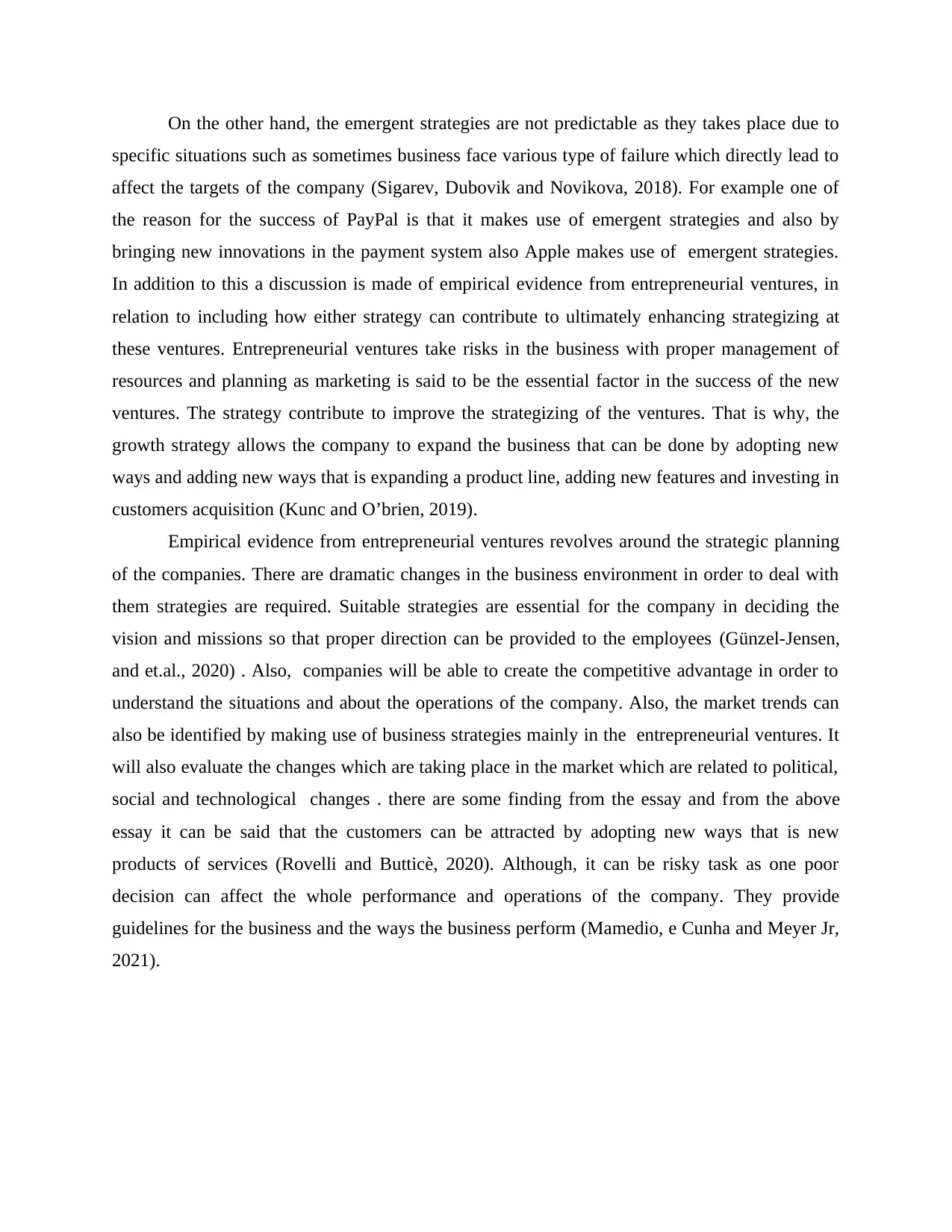
On the other hand, the emergent strategies are not predictable as they takes place due to
specific situations such as sometimes business face various type of failure which directly lead to
affect the targets of the company (Sigarev, Dubovik and Novikova, 2018). For example one of
the reason for the success of PayPal is that it makes use of emergent strategies and also by
bringing new innovations in the payment system also Apple makes use of emergent strategies.
In addition to this a discussion is made of empirical evidence from entrepreneurial ventures, in
relation to including how either strategy can contribute to ultimately enhancing strategizing at
these ventures. Entrepreneurial ventures take risks in the business with proper management of
resources and planning as marketing is said to be the essential factor in the success of the new
ventures. The strategy contribute to improve the strategizing of the ventures. That is why, the
growth strategy allows the company to expand the business that can be done by adopting new
ways and adding new ways that is expanding a product line, adding new features and investing in
customers acquisition (Kunc and O’brien, 2019).
Empirical evidence from entrepreneurial ventures revolves around the strategic planning
of the companies. There are dramatic changes in the business environment in order to deal with
them strategies are required. Suitable strategies are essential for the company in deciding the
vision and missions so that proper direction can be provided to the employees (Günzel-Jensen,
and et.al., 2020) . Also, companies will be able to create the competitive advantage in order to
understand the situations and about the operations of the company. Also, the market trends can
also be identified by making use of business strategies mainly in the entrepreneurial ventures. It
will also evaluate the changes which are taking place in the market which are related to political,
social and technological changes . there are some finding from the essay and from the above
essay it can be said that the customers can be attracted by adopting new ways that is new
products of services (Rovelli and Butticè, 2020). Although, it can be risky task as one poor
decision can affect the whole performance and operations of the company. They provide
guidelines for the business and the ways the business perform (Mamedio, e Cunha and Meyer Jr,
2021).
specific situations such as sometimes business face various type of failure which directly lead to
affect the targets of the company (Sigarev, Dubovik and Novikova, 2018). For example one of
the reason for the success of PayPal is that it makes use of emergent strategies and also by
bringing new innovations in the payment system also Apple makes use of emergent strategies.
In addition to this a discussion is made of empirical evidence from entrepreneurial ventures, in
relation to including how either strategy can contribute to ultimately enhancing strategizing at
these ventures. Entrepreneurial ventures take risks in the business with proper management of
resources and planning as marketing is said to be the essential factor in the success of the new
ventures. The strategy contribute to improve the strategizing of the ventures. That is why, the
growth strategy allows the company to expand the business that can be done by adopting new
ways and adding new ways that is expanding a product line, adding new features and investing in
customers acquisition (Kunc and O’brien, 2019).
Empirical evidence from entrepreneurial ventures revolves around the strategic planning
of the companies. There are dramatic changes in the business environment in order to deal with
them strategies are required. Suitable strategies are essential for the company in deciding the
vision and missions so that proper direction can be provided to the employees (Günzel-Jensen,
and et.al., 2020) . Also, companies will be able to create the competitive advantage in order to
understand the situations and about the operations of the company. Also, the market trends can
also be identified by making use of business strategies mainly in the entrepreneurial ventures. It
will also evaluate the changes which are taking place in the market which are related to political,
social and technological changes . there are some finding from the essay and from the above
essay it can be said that the customers can be attracted by adopting new ways that is new
products of services (Rovelli and Butticè, 2020). Although, it can be risky task as one poor
decision can affect the whole performance and operations of the company. They provide
guidelines for the business and the ways the business perform (Mamedio, e Cunha and Meyer Jr,
2021).
⊘ This is a preview!⊘
Do you want full access?
Subscribe today to unlock all pages.

Trusted by 1+ million students worldwide
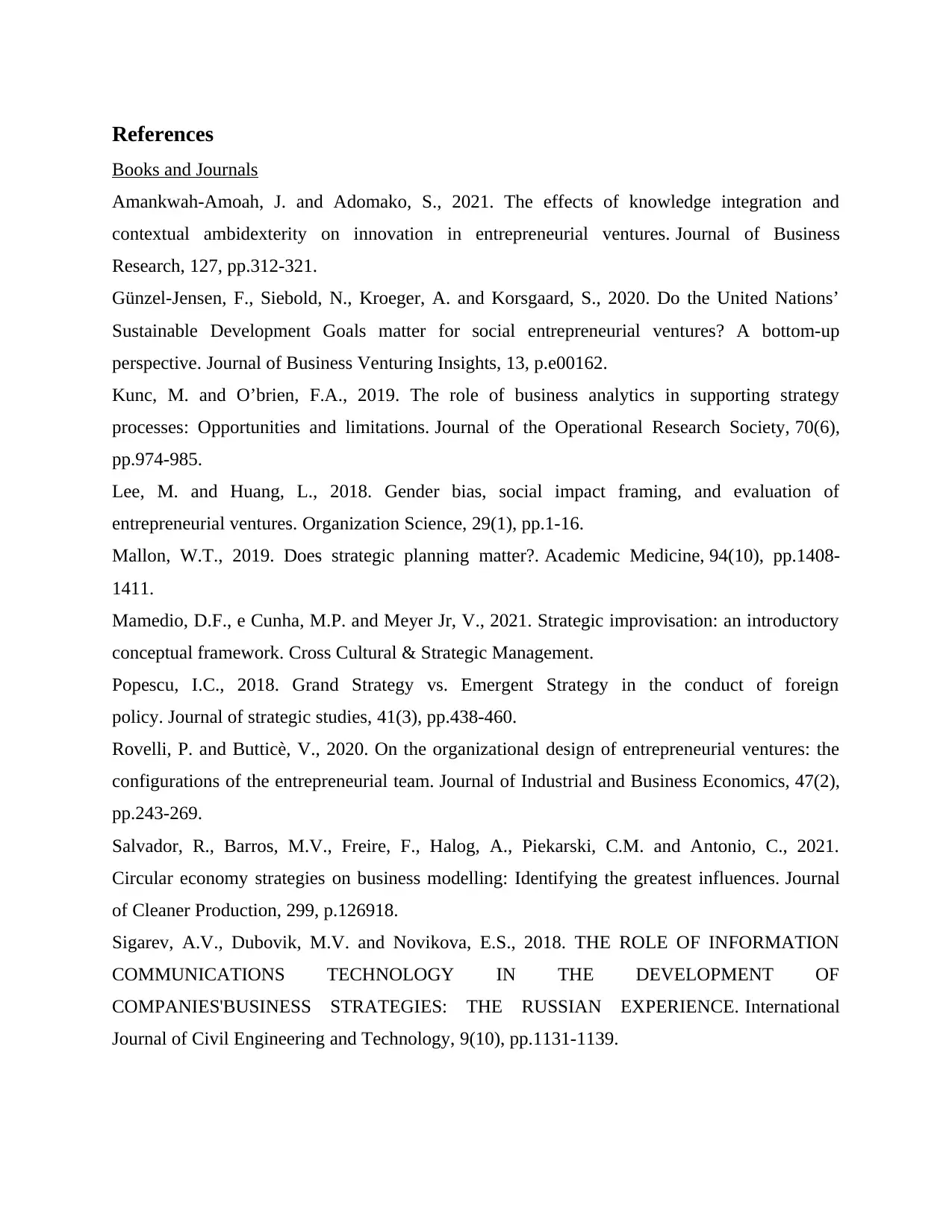
References
Books and Journals
Amankwah-Amoah, J. and Adomako, S., 2021. The effects of knowledge integration and
contextual ambidexterity on innovation in entrepreneurial ventures. Journal of Business
Research, 127, pp.312-321.
Günzel-Jensen, F., Siebold, N., Kroeger, A. and Korsgaard, S., 2020. Do the United Nations’
Sustainable Development Goals matter for social entrepreneurial ventures? A bottom-up
perspective. Journal of Business Venturing Insights, 13, p.e00162.
Kunc, M. and O’brien, F.A., 2019. The role of business analytics in supporting strategy
processes: Opportunities and limitations. Journal of the Operational Research Society, 70(6),
pp.974-985.
Lee, M. and Huang, L., 2018. Gender bias, social impact framing, and evaluation of
entrepreneurial ventures. Organization Science, 29(1), pp.1-16.
Mallon, W.T., 2019. Does strategic planning matter?. Academic Medicine, 94(10), pp.1408-
1411.
Mamedio, D.F., e Cunha, M.P. and Meyer Jr, V., 2021. Strategic improvisation: an introductory
conceptual framework. Cross Cultural & Strategic Management.
Popescu, I.C., 2018. Grand Strategy vs. Emergent Strategy in the conduct of foreign
policy. Journal of strategic studies, 41(3), pp.438-460.
Rovelli, P. and Butticè, V., 2020. On the organizational design of entrepreneurial ventures: the
configurations of the entrepreneurial team. Journal of Industrial and Business Economics, 47(2),
pp.243-269.
Salvador, R., Barros, M.V., Freire, F., Halog, A., Piekarski, C.M. and Antonio, C., 2021.
Circular economy strategies on business modelling: Identifying the greatest influences. Journal
of Cleaner Production, 299, p.126918.
Sigarev, A.V., Dubovik, M.V. and Novikova, E.S., 2018. THE ROLE OF INFORMATION
COMMUNICATIONS TECHNOLOGY IN THE DEVELOPMENT OF
COMPANIES'BUSINESS STRATEGIES: THE RUSSIAN EXPERIENCE. International
Journal of Civil Engineering and Technology, 9(10), pp.1131-1139.
Books and Journals
Amankwah-Amoah, J. and Adomako, S., 2021. The effects of knowledge integration and
contextual ambidexterity on innovation in entrepreneurial ventures. Journal of Business
Research, 127, pp.312-321.
Günzel-Jensen, F., Siebold, N., Kroeger, A. and Korsgaard, S., 2020. Do the United Nations’
Sustainable Development Goals matter for social entrepreneurial ventures? A bottom-up
perspective. Journal of Business Venturing Insights, 13, p.e00162.
Kunc, M. and O’brien, F.A., 2019. The role of business analytics in supporting strategy
processes: Opportunities and limitations. Journal of the Operational Research Society, 70(6),
pp.974-985.
Lee, M. and Huang, L., 2018. Gender bias, social impact framing, and evaluation of
entrepreneurial ventures. Organization Science, 29(1), pp.1-16.
Mallon, W.T., 2019. Does strategic planning matter?. Academic Medicine, 94(10), pp.1408-
1411.
Mamedio, D.F., e Cunha, M.P. and Meyer Jr, V., 2021. Strategic improvisation: an introductory
conceptual framework. Cross Cultural & Strategic Management.
Popescu, I.C., 2018. Grand Strategy vs. Emergent Strategy in the conduct of foreign
policy. Journal of strategic studies, 41(3), pp.438-460.
Rovelli, P. and Butticè, V., 2020. On the organizational design of entrepreneurial ventures: the
configurations of the entrepreneurial team. Journal of Industrial and Business Economics, 47(2),
pp.243-269.
Salvador, R., Barros, M.V., Freire, F., Halog, A., Piekarski, C.M. and Antonio, C., 2021.
Circular economy strategies on business modelling: Identifying the greatest influences. Journal
of Cleaner Production, 299, p.126918.
Sigarev, A.V., Dubovik, M.V. and Novikova, E.S., 2018. THE ROLE OF INFORMATION
COMMUNICATIONS TECHNOLOGY IN THE DEVELOPMENT OF
COMPANIES'BUSINESS STRATEGIES: THE RUSSIAN EXPERIENCE. International
Journal of Civil Engineering and Technology, 9(10), pp.1131-1139.
Paraphrase This Document
Need a fresh take? Get an instant paraphrase of this document with our AI Paraphraser

Thies, F., Huber, A., Bock, C., Benlian, A. and Kraus, S., 2019. Following the crowd—does
crowdfunding affect venture capitalists’ selection of entrepreneurial ventures?. Journal of Small
Business Management, 57(4), pp.1378-1398.
crowdfunding affect venture capitalists’ selection of entrepreneurial ventures?. Journal of Small
Business Management, 57(4), pp.1378-1398.

⊘ This is a preview!⊘
Do you want full access?
Subscribe today to unlock all pages.

Trusted by 1+ million students worldwide
1 out of 9
Related Documents
Your All-in-One AI-Powered Toolkit for Academic Success.
+13062052269
info@desklib.com
Available 24*7 on WhatsApp / Email
![[object Object]](/_next/static/media/star-bottom.7253800d.svg)
Unlock your academic potential
Copyright © 2020–2025 A2Z Services. All Rights Reserved. Developed and managed by ZUCOL.



